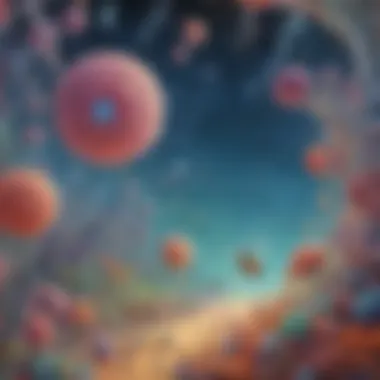Unlocking Young Minds: Summer of STEM Science Exploration


Science Fun Facts
Lab Littles is excited to dive into a world filled with fascinating science facts and trivia in our 'Summer of STEM' series. Did you know that the smallest bone in the human body is located in the ear? It's called the stapes! Delve into quirky science stories like the discovery of penicillin by Alexander Fleming or the intriguing concept of black holes. Explore amazing science records, such as the highest temperature ever recorded on Earth or the farthest distance reached by a human-made object in space. Get ready to ponder over thought-provoking questions like why the sky appears blue or how DNA determines our unique traits.
Discover the Wonders of Science
Embark on a journey of scientific exploration with Lab Littles as we unravel various captivating scientific concepts. Engage with educational videos and animations that make complex ideas easy to comprehend. Dive into interactive learning tools that transform learning into an exciting adventure. Explore real-life applications of science in everyday scenarios, from the physics behind roller coasters to the biology of photosynthesis. Let us ignite your curiosity and inspire a lifelong love for the marvels of science!
Science Quiz Time
Challenge your knowledge and critical thinking skills with Lab Littles' interactive science quizzes. Put your reasoning to the test with multiple-choice questions that stimulate your intellect. Have fun solving brain teasers and puzzles that exercise your problem-solving abilities. Experience the thrill of learning through gamification, where education meets entertainment seamlessly. Get ready to boost your scientific knowledge and enjoy a playful learning experience like never before!
Science Experiment Showcase
Step into the Lab Littles laboratory and explore a world of fun and engaging experiments that ignite your scientific spirit. Follow step-by-step instructions to conduct hands-on experiments that showcase fundamental principles of science. Check the materials list to gather items for your exploration and be prepared to unlock the wonders of science. Prioritize safety with our carefully outlined tips and precautions to ensure a secure and enjoyable experimental journey. Let the science experiment showcase bring out the budding scientist in you!
Introduction to Summer of STEM
Lab Littles brings forward the groundbreaking 'Summer of STEM,' a series aimed at enlightening young minds between the ages of 6-12. The significance of this introduction lies in its ability to kindle a passion for scientific exploration among the future generation. By delving into this realm of interactive learning, children are exposed to a world where curiosity reigns supreme, encouraging them to ponder, question, and understand the wonders of science. The fundamental elements of the Summer of STEM encompass educational enrichment and stimulating activities carefully crafted to engage and educate budding scientists.
Welcome to LabLittles
Lab
Littles: Infotainment for Little Science Buddies In the captivating world of Lab Littles: Infotainment for Little Science Buddies, children are immersed in a fusion of information and entertainment tailored to their burgeoning scientific curiosity. The key characteristic that sets LabLittles apart is its ability to present complex scientific concepts in a simplified and engaging manner, making learning a delightful experience rather than a mundane task. This aspect of LabLittles proves to be a pivotal choice for the Summer of STEM series, as it cleverly combines education with entertainment, ensuring that young learners remain engrossed and eager to unravel the mysteries of science. A unique feature of LabLittles is its seamless integration of interactive elements, allowing children to actively participate in scientific discoveries and experiments, thereby enhancing their understanding and retention of knowledge.
Target Audience: Kids and Education Enthusiasts
The target audience of Lab Littles primarily comprises children and education enthusiasts seeking to cultivate a deep-rooted love for learning and exploration. LabLittles caters to this demographic by providing content that is not only informative but also fun and engaging, thereby capturing the attention of young minds and fostering a passion for scientific inquiry. The key characteristic of LabLittles' target audience lies in their eagerness to explore and discover new phenomena, making them ideal candidates for the enriching experiences offered in the Summer of STEM series. A notable advantage of targeting kids and education enthusiasts is the opportunity to mold inquisitive young minds into future innovators and critical thinkers, laying a strong foundation for lifelong learning.
Purpose of 'Summer of STEM'
Educational Focus


The cornerstone of the Summer of STEM lies in its educational focus, which aims to provide young learners with a comprehensive and enriching scientific experience. This aspect of the series emphasizes the importance of hands-on learning and interactive engagement, fostering a deep understanding of core scientific principles. The key characteristic of the educational focus is its seamless integration of entertainment with education, ensuring that children not only grasp complex concepts but also enjoy the learning process. This strategy proves to be a beneficial choice for the Summer of STEM, as it bridges the gap between theoretical knowledge and practical application, offering a holistic learning experience to participants. An advantage of the educational focus is its ability to cater to diverse learning styles, accommodating visual, auditory, and kinesthetic learners through a range of interactive activities and resources.
Engaging Science Exploration
Engaging Science Exploration serves as the driving force behind the Summer of STEM series, captivating young minds and stimulating their curiosity through interactive and thought-provoking activities. The key characteristic of this aspect is its ability to spark interest in scientific subjects by presenting them in a captivating and easily digestible format. By making science accessible and engaging, Engaging Science Exploration becomes a popular choice for engaging children in STEM-related fields. A unique feature of this element is its emphasis on real-world applications and hands-on experiments, enabling children to explore scientific concepts in a practical and experiential manner. This hands-on approach not only enhances learning retention but also encourages creativity and critical thinking among participants.
Benefits of STEM Learning
Critical Thinking Development
Critical Thinking Development plays a crucial role in the Summer of STEM series, nurturing young minds to think analytically, solve problems, and approach challenges with a logical mindset. The key characteristic of critical thinking is its ability to enhance cognitive skills, enabling children to evaluate information critically and make informed decisions based on evidence and reasoning. This aspect is a beneficial choice for the Summer of STEM as it empowers participants to think independently, ask probing questions, and explore various perspectives, thereby honing their analytical abilities. A unique feature of critical thinking development is its applicability beyond the realms of science, equipping children with essential skills that are transferable to other academic disciplines and real-life situations.
Hands-On Learning Experience
The hands-on learning experience offered in the Summer of STEM series provides children with a tangible and immersive approach to scientific exploration. The key characteristic of hands-on learning is its ability to reinforce theoretical concepts through practical application, allowing participants to experiment, make observations, and draw conclusions in a collaborative learning environment. This experiential approach proves to be a popular choice for the Summer of STEM, as it fosters a deeper understanding of scientific principles and encourages active participation in the learning process. A notable advantage of the hands-on learning experience is its ability to cultivate a sense of curiosity and wonder in children, motivating them to engage with science beyond the confines of the classroom and explore the mysteries of the natural world.
Exploring Science Topics
In this article, we delve into the significance of Exploring Science Topics within the framework of the 'Summer of STEM' initiative by Lab Littles. This section serves as a fundamental pillar in fostering a deep-rooted interest in science among children aged 6-12. The exploration of various scientific domains such as Physics, Chemistry, and Biology aims to instill a sense of curiosity and a desire for knowledge. By immersing young minds in interactive learning experiences, the 'Exploring Science Topics' segment paves the way for a holistic understanding of scientific phenomena. Emphasizing critical thinking skills and hands-on experimentation, this section lays the groundwork for a lifelong appreciation of STEM disciplines.
Physics Wonders
Interactive Experiments
Delve into the realm of Physics with the captivating realm of Interactive Experiments. These hands-on activities engage young learners by allowing them to witness scientific principles in action. By actively participating in experiments, children grasp complex concepts with ease, fostering a sense of exploration and discovery. The key characteristic of Interactive Experiments lies in their ability to demystify intricate laws of nature through practical application. This method not only enhances understanding but also cultivates a penchant for experimentation and observation among budding scientists. While Interactive Experiments hold the advantage of making abstract theories tangible, they may require adult supervision due to the nature of equipment involved.
Concept Exploration
Embark on a journey of Concept Exploration within the realm of Physics, uncovering the underlying principles that govern the universe. This segment delves into theoretical aspects, encouraging young enthusiasts to ponder the nature of matter, energy, and forces. By highlighting key concepts in Physics, Concept Exploration equips children with foundational knowledge essential for scientific inquiry. The unique feature of this exploration lies in its ability to stimulate intellectual curiosity and prompt questions about the natural world. While Concept Exploration offers a theoretical foundation, hands-on applications through experiments complement this learning approach, providing a well-rounded educational experience.
Chemistry Adventures
Fun-filled Activities


Enter the captivating world of Chemistry through Fun-filled Activities designed to ignite a passion for chemical exploration. These engaging tasks aim to make learning enjoyable by disguising education within entertainment. The essence of Fun-filled Activities lies in their ability to transform complex chemical reactions into playful and interactive experiences. By incorporating elements of gamification, these activities ensure active participation while imparting valuable scientific knowledge. The unique feature of Fun-filled Activities is their seamless blend of entertainment and education, fostering a positive attitude towards Chemistry. However, adult supervision may be necessary during experiments involving substances for safety reasons.
Elementary Reactions
Dive into the realm of Chemistry with a focus on Elementary Reactions, unraveling the basic building blocks of chemical transformations. This section explores the fundamental principles of chemical reactions, introducing children to the wonders of molecular interactions. The key characteristic of Elementary Reactions lies in their ability to simplify complex chemical processes into easy-to-understand concepts. By emphasizing foundational reactions, this segment equips young learners with the essential knowledge needed to navigate the world of Chemistry. The unique feature of Elementary Reactions is their role in establishing a solid groundwork for future exploration into more advanced chemical phenomena. While Elementary Reactions offer a glimpse into the world of Chemistry, prudent handling of chemicals is advised to ensure a safe learning environment.
Biology Explorations
Nature Studies
Embark on an expedition of Nature Studies within the domain of Biology, unveiling the wonders of the natural world. This segment encourages children to observe and comprehend the diverse ecosystems that surround them, fostering an appreciation for biodiversity. The key characteristic of Nature Studies lies in their emphasis on observation and documentation of flora and fauna, promoting ecological awareness among young minds. By engaging in nature-centric activities, children develop a profound connection to the environment, nurturing a sense of stewardship towards the planet. The unique feature of Nature Studies is their ability to inspire awe and curiosity about the intricate balance of life on Earth. While Nature Studies offer valuable insights into the ecosystem, cautionary measures must be taken during outdoor expeditions to ensure safety.
Creature Discoveries
Unveil the mysteries of the animal kingdom through Creature Discoveries, an enthralling exploration into the realm of Biology. This segment introduces children to the diversity of life forms inhabiting our planet, from microscopic organisms to majestic mammals. The key characteristic of Creature Discoveries is their focus on animal behavior, anatomy, and habitats, facilitating a deeper understanding of biological diversity. By studying different species and their adaptations, children develop a sense of empathy and respect for all living beings. The unique feature of Creature Discoveries is their role in fostering a sense of wonder and appreciation for the complexity of life forms. While Creature Discoveries offer a glimpse into the fascinating world of Biology, adult guidance is recommended when interacting with live animals to ensure both child safety and respect for wildlife.
Engaging Activities and Resources
Engaging Activities and Resources play a pivotal role in 'Summer of STEM' by providing a hands-on and immersive learning experience to children aged 6-12. These activities aim to stimulate curiosity, foster creativity, and enhance critical thinking skills. By engaging in activities like Science quizzes, DIY experiments, and educational games, young learners can actively participate in their education, making the learning process enjoyable and memorable. One key benefit of these activities is the opportunity they offer for practical application of theoretical knowledge, allowing children to see real-world implications of scientific concepts. Moreover, these resources serve as a bridge between theoretical learning and practical understanding, making science more accessible and engaging for young minds.
Science Quizzes
Test Your Knowledge
Test Your Knowledge quizzes are designed to evaluate children's understanding of various scientific concepts covered in the 'Summer of STEM' articles. These quizzes not only test what children have learned but also encourage them to think critically and apply their knowledge in problem-solving scenarios. One of the key characteristics of Test Your Knowledge quizzes is the varied format they come in, ranging from multiple-choice questions to fill-in-the-blank exercises. This diversity ensures that children are engaged in different ways, catering to various learning styles. One advantage of Test Your Knowledge quizzes is their ability to provide instant feedback, allowing children to track their progress and identify areas for improvement. However, a potential disadvantage is the need for careful curation to ensure questions are age-appropriate and relevant to the educational goals of the program.
Quirky Questions
Quirky Questions inject an element of fun and surprise into the Science quizzes, keeping children engaged and excited about learning. These questions are designed to challenge conventional thinking and spark creativity in problem-solving. A key characteristic of Quirky Questions is their unconventional nature, often presenting scenarios that prompt out-of-the-box thinking. This unique feature not only tests children's knowledge but also encourages them to approach problems from different perspectives. One advantage of Quirky Questions is their ability to stimulate curiosity and exploration, prompting children to think beyond the obvious. However, a disadvantage could be the need for clear explanations to ensure children grasp the underlying scientific concepts behind the quirky scenarios.
DIY Experiments
Hands-On Projects


Hands-On Projects in the 'Summer of STEM' offer children the opportunity to engage with science through experiential learning. These projects involve practical tasks that allow children to see scientific principles in action, fostering a deeper understanding of complex concepts. A key characteristic of Hands-On Projects is their emphasis on tactile learning, encouraging children to use their hands and senses to explore the world around them. This hands-on approach not only enhances retention but also develops crucial motor skills and hand-eye coordination. One advantage of Hands-On Projects is the level of engagement they provide, making learning interactive and dynamic. However, a potential disadvantage could be the need for adequate adult supervision, especially for experiments involving potentially hazardous materials.
Creative Innovations
Creative Innovations introduce a creative element to DIY experiments, challenging children to think innovatively and problem-solve creatively. These projects often involve designing and building solutions to scientific challenges, fostering inventive thinking and experimentation. A key characteristic of Creative Innovations is the freedom they offer for children to express their unique ideas and solutions, promoting individuality and creativity. This unique feature not only sparks imagination but also cultivates an entrepreneurial mindset, encouraging children to explore and test their innovative capabilities. One advantage of Creative Innovations is their potential to inspire lifelong passion for innovation and discovery. However, a downside could be the need for adequate resources and materials to facilitate children's creative projects.
Educational Games
Interactive Learning
Interactive Learning games in the 'Summer of STEM' blur the line between education and entertainment, providing a fun way for children to enhance their scientific knowledge. These games are designed to be engaging and stimulating, offering challenges and rewards that motivate children to learn while having fun. A key characteristic of Interactive Learning games is their adaptive nature, adjusting difficulty levels based on children's performance to ensure a personalized learning experience. This adaptability not only keeps children challenged but also prevents them from feeling overwhelmed or uninterested. One advantage of Interactive Learning games is their potential to gamify education, making learning enjoyable and rewarding. However, a possible downside could be the need for careful monitoring to ensure children maintain a balance between screen time and other activities.
Puzzle Challenges
Puzzle Challenges in the 'Summer of STEM' present children with brain-teasing problems that require critical thinking and problem-solving skills. These challenges range from logic puzzles to pattern recognition tasks, stimulating children's cognitive abilities and fostering a strategic mindset. A key characteristic of Puzzle Challenges is their capacity to encourage persistence and resilience in children, teaching them the value of perseverance in overcoming obstacles. This resilience-building aspect not only enhances children's problem-solving skills but also instills a growth mindset that values learning from mistakes. One advantage of Puzzle Challenges is their ability to boost children's confidence levels as they successfully tackle increasingly complex puzzles. Nevertheless, a challenge could be to provide a variety of puzzles that cater to different skill levels and learning preferences.
Inspiring the Young Scientists
The significance of the 'Inspiring the Young Scientists' section in our article lies in its crucial role in nurturing the curiosity and passion for science among children aged 6-12. At Lab Littles, we understand the pivotal impact of fostering a love for scientific inquiry at a young age by encouraging critical thinking and hands-on experimentation. By delving into topics that spark interest and curiosity, we aim to lay the foundation for a future generation of innovative thinkers and problem solvers, enriching their cognitive development and creative skills. Our focus on 'Inspiring the Young Scientists' transcends mere education; it's about igniting a lifelong enthusiasm for discovery and exploration which is paramount in stimulating young minds towards STEM subjects.
Encouraging Curiosity
Questioning Nature:
In this segment, we delve into the art of questioning nature, a fundamental aspect of scientific exploration. By encouraging children to inquire, observe, and seek answers to the wonders of the natural world, we foster a deep sense of curiosity and the habit of critical analysis. Emphasizing the importance of curiosity-driven questioning, we instill a sense of wonder and an eagerness to unravel the mysteries that surround us. This approach not only cultivates a thirst for knowledge but also cultivates analytical thinking skills and a scientific mindset, essential for educational advancement and personal growth. By exploring and questioning nature, children develop a resilient curiosity that propels them towards a deeper understanding of the world around them.
Exploring Possibilities:
Exploring Possibilities signifies the exploration of innovative ideas, experimentation, and embracing creativity. This aspect encourages young minds to think beyond conventional boundaries, fostering a mindset that welcomes challenges and embraces varied perspectives. By delving into the realm of endless possibilities, children learn to adapt, innovate, and approach problems with resilience and flexibility. This mentality not only nurtures their imagination but also equips them with the skills necessary to tackle real-world challenges with confidence and ingenuity. Through exploring possibilities, children develop a growth mindset that propels them towards continuous learning and exploration, shaping them into adaptive and forward-thinking individuals capable of driving positive change in society.
Future Innovation
STEM Careers:
The discussion on STEM Careers sheds light on the vast opportunities and contributions these fields offer to the future generation, underscoring their significance in the modern technological landscape. By highlighting the importance of STEM disciplines (Science, Technology, Engineering, and Mathematics) in unlocking potential career paths, children are inspired to pursue fields that are not only in demand but also have a profound impact on society. STEM careers not only offer diverse and exciting professional avenues but also pave the way for meaningful contributions to scientific progression and societal betterment. By lauding STEM careers, we aim to inspire young minds to explore these realms, fostering a keen interest in fields that drive innovation and progress.
Technological Advancements:
Technological Advancements encompass the revolutionary strides and breakthroughs in technology, emphasizing their pivotal role in shaping modern society. By spotlighting the influence of technology on various aspects of life, this discussion provides insight into how advancements in technology have transformed industries, communication, and daily living. Recognizing the impact of innovation on global progression, children are encouraged to embrace technology not just as users but as future innovators and creators. Understanding technological advancements equips young minds with the knowledge and appreciation of how technology shapes the world, inspiring them to explore possibilities and contribute to the ever-evolving technological landscape. This awareness instills a sense of responsibility and curiosity, preparing children to navigate the digital era with confidence and adaptability.







